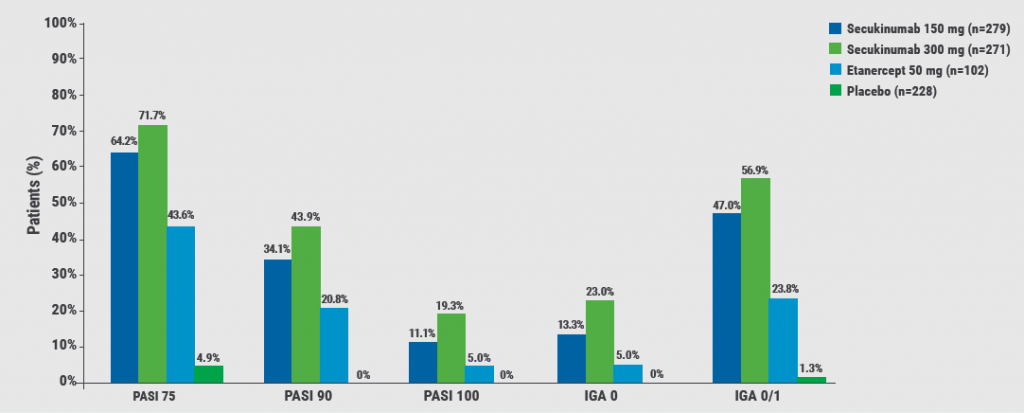The association between psoriasis and occlusive cardiovascular events was noted originally nearly 50 years ago [1], and it is generally attributed to the heightened systematic inflammation present in psoriasis patients, which results in excess low-density lipoproteins lining the arteries. What was not yet known was whether modulating the inflammatory condition with immunotherapy would result in reduced risk of cardiovascular disease.
Dr Nehal Mehta (National Heart, Lung, and Blood Institute, NIH, USA) presented the just-published results of the first in-human evidence that treating psoriasis patients with biologic systemic therapies has positive consequences on cardiovascular outcomes [2,3]. This prospective, observational study of the NIH Psoriasis Atherosclerosis Cardiometabolic Initiative cohort included 290 psoriasis patients, 121 of whom suffered moderate-to-severe skin disease and qualified for the biologic therapy according to treatment guidelines. For a year, Dr Mehta and colleagues followed the entire cohort, all of whom had low cardiovascular risk at baseline, and compared the patients on biological treatments with those who did not receive biologic therapy. High-risk coronary plaque phenotypes were measured by coronary computed tomography angiography. A blinded reader (blinded to patient demographics, visit, and treatment) quantified total coronary plaque burden and plaque subcomponents (calcified and non-calcified) in the 3 main coronary vessels >2 mm.
Study results showed that biologic therapy was associated with an 8% reduction in coronary artery plaque, while other changes in other cardiovascular risk factors such as cholesterol, glucose, and blood pressure were unchanged. “The findings that intrigued us most were that coronary plaque sub-components changed over 1 year, including the necrotic core and non-calcified components, which are the culprits for most heart attacks,” Dr Mehta said. These findings highlight that using biologic therapies to reduce the underlying inflammatory disease in patients has benefits in secondary complications, such as coronary artery disease, in particular of rupture-prone plaque. However, it should be noted that this data is observational at this point, necessitating the initiation of randomised, controlled trials.
By extrapolation, biologic intervention might also be relevant for patients with chronic atopic dermatitis (AD), as pointed out by Prof. Emma Guttman-Yassky (Mount Sinai Medical School, USA) [4]. She noted that the AD transcriptome highlights atherosclerosis signalling in AD. The researchers took multiple profiles from AD patients and put them together in a meta-analysis approach, revealing the atherosclerosis pathway is one of the top pathways in AD patients [5]. Furthermore, many recent studies show an association between adult AD, cardiovascular disease, and increased heart attacks in 3 population-based studies [6]. In the NHANES study, flexural eczema in the past year was associated with significantly higher odds of cardiac arrest (P=0.04), heart attack (P<0.01), and congestive heart failure (P=0.02) but not with stroke (P=0.37) in survey-weighted multivariate logistic regression models that controlled for socio-demographics, comorbid asthma, and hay fever. The NHIS 2010 and 2012 studies reported that 1-year history of eczema correlates with a significantly higher odds of cardiac arrest (P=0.02), angina (P=0.02), heart attack (P=0.047), other heart diseases (P<0.001), stroke (P=0.02), and PVD (P< 0.0001) in multivariate models. Collectively, this data is alarming, but the coming years will deliver clinical data with regard to the effects of timely control of systemic inflammation by innovative biologics.
- McDonald CJ, Calabresi P. N Engl J Med. 1973 Apr 26;288(17):912.
- Mehta NN. Plenary 2.6, SPIN 2019, 25-27 April, Paris, France.
- Elnabawi YA, et al. Cardiovasc Res. 2019 Mar 15;115(4):721-728.
- Guttman-Yassky E. Pleanary 1.4, SPIN 2019, 25-27 April, Paris, France.
- Ewald DA, et al et al. BMC Med Genomics. 2015 Oct 12;8:60.
- Silverberg JI. Allergy.2015; 70(10): 1300-1308.
Posted on
Previous Article
« Atopic dermatitis and psoriasis: on a spectrum? Next Article
Certolizumab: Long-term safety and efficacy results for psoriasis-related nail disease »
« Atopic dermatitis and psoriasis: on a spectrum? Next Article
Certolizumab: Long-term safety and efficacy results for psoriasis-related nail disease »
Table of Contents: SPIN 2019
Featured articles
Letter from the Editor
Aetiology: Triggers and Risk Factors
Understanding genetics to unravel psoriasis and atopic dermatitis pathogenesis
Atopic dermatitis and psoriasis: on a spectrum?
Advances in Therapy
Advances in target-oriented therapy: psoriatic arthritis
Favourable safety profile of long-term use of ixekizumab
Brodalumab onset of action is significantly faster than ustekinumab: Results from the phase 3 AMAGINE-2 and -3 studies
Adalimumab vs adalimumab + methotrexate in psoriasis: First-year results on effectiveness, drug survival, safety, and immunogenicity
Ustekinumab for the treatment of moderate-to-severe plaque psoriasis in paediatric patients
Fumarates and vitamin A derivatives advance and latest insights in non-biologic systemic therapeutic agents in psoriasis and atopic dermatitis
Certolizumab: Long-term safety and efficacy results for psoriasis-related nail disease
Novel Considerations
Granulomatous rosacea: exploratory histological markers
Live imaging of cutaneous immune responses
Results from the ECLIPSE trial: does blocking IL-23 have better long-term outcomes in psoriasis?
ABP501 biosimilar for adalimumab: What you need to know
Sustained and complete responses from the phase 3 AMAGINE-2 and -3 studies
Reduction in coronary artery disease in psoriasis patients treated with biologic therapies, possible implications for atopic dermatitis
Small molecules, apremilast, and TYK2
Related Articles
April 19, 2019
Psoriasis and Biologics: The Beat Goes On

October 9, 2019
IL-17 blocker: effective and safe in patients with comorbidities
© 2024 Medicom Medical Publishers. All rights reserved. Terms and Conditions | Privacy Policy
HEAD OFFICE
Laarderhoogtweg 25
1101 EB Amsterdam
The Netherlands
T: +31 85 4012 560
E: publishers@medicom-publishers.com

